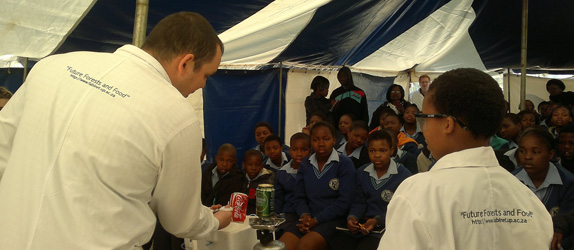|
The students and staff of the CPHB and the Tree Protection Co-operative Programme (TPCP) are involved in various outreach initiatives. These initiatives serve to educate and bring knowledge and information to people whether they are our future scientists or those supporting science in South Africa. The initiatives touch the lives of learners (both primary and high school), students at Higher Education Institutions and also the general public. 
Mentorship programmeThe vision for the CPHB includes a strong mentoring component, which is in part achieved with the CPHB Mentorship programme. In this programme undergraduate students are mentored by postgraduate students in the CPHB / TPCP. For this programme, undergraduate students who have the potential to follow long-term careers in science are specifically targeted. The Mentorship programme has numerous important areas of impact. Firstly, the undergraduate students in the programme are exposed to a strong culture of science in a programme that is internationally competitive. Secondly, by targeting undergraduate students, the Mentorship programme promotes postgraduate studies among its mentees, as well as their peers because they will most probably communicate some of their experiences to their peers. The end result is that the broader student body becomes better informed about what a career in science can offer them. Finally, the mentorship programme is also beneficial to postgraduate students. Having to mentor a student can be an important learning experience and being able to mentor young scientists is an essential element of any career in science or research. National Science Week, ad hoc exhibitions and school visitsThe CPHB student body is actively involved every year in the National Science Week. During this week, the CPHB students spark the enthusiasm of learners for science through the use of interesting, and sometimes outrageous, experiments. Students and staff of the CPHB are also regularly participating in official exhibitions and school visits during which they present their research and inform the public about the different research areas of the programme. (See "Information Nuggets" for more interesting stories) |
Outreach Initiatives
New Publications
Postma A, Klynsmith L, Duong TA, Allison JD, Smidt W, Waterhouse RM, Lesny P, Oeyen JP, Petersen M, Martin S, Liu S, Zhou X, Ziesmann T, Donath A, Mayer C, Misof B, Niehuis O, Peters RS, Podsiadlowski L, Coetzee MPA, Joubert F, Slippers B. (2026) Genome and transcriptome-based identification and expression profiling of chemosensory gene families across developmental stages and tissues in Sirex noctilio (Hymenoptera: Siricidae). Insect Molecular Biology :1-14.
10.1111/imb.70029
Liu QL, Wingfield MJ, Duong TA, Wingfield BD, Crous PW. (2026) Taxonomy, distribution and dispersal of Calonectria species: Important pathogens of forestry, agricultural and horticultural crops. Current Forestry Reports 12(4)
10.1007/s40725-025-00262-8
Nethononda PD, Hurley BP, Slippers B, Makhura MN. (2026) Smallholder farmers’ knowledge, perception and management of Spodoptera frugiperda (Lepidoptera: Noctuidae) on Zea mays at irrigation schemes in Limpopo province, South Africa. Crop Protection :107457.
10.1016/j.cropro.2025.107457
Thomas C, Wilken PM, Coetzee MPA, Visagie CM. (2025) Advancing the taxonomy of Sclerotinia (Helotiales, Sclerotiniaceae): a review and recommendations for an important plant-pathogenic genus. IMA Fungus 17:e175737.
10.3897/imafungus.17.175737
Roux J, del M Angel L, Barnes I. (2025) First report of the eucalypt stem canker pathogen Teratosphaeria gauchensis in South Africa. New Disease Reports 52(2):e70091.
10.1002/ndr2.70091

